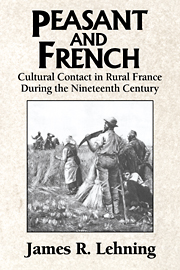Book contents
- Frontmatter
- Contents
- List of tables
- List of figures
- Acknowledgments
- 1 Introductory positions
- 2 The French nation and its peasants
- 3 The landscape in the early nineteenth century
- 4 Changes in the landscape
- 5 Gender, places, people
- 6 The ambiguities of schooling
- 7 Inside the parish church
- 8 A new site: electoral politics
- 9 Conclusion: toward a new rural history
- Sources and references
- Index
6 - The ambiguities of schooling
Published online by Cambridge University Press: 23 September 2009
- Frontmatter
- Contents
- List of tables
- List of figures
- Acknowledgments
- 1 Introductory positions
- 2 The French nation and its peasants
- 3 The landscape in the early nineteenth century
- 4 Changes in the landscape
- 5 Gender, places, people
- 6 The ambiguities of schooling
- 7 Inside the parish church
- 8 A new site: electoral politics
- 9 Conclusion: toward a new rural history
- Sources and references
- Index
Summary
The contrast between a traditional society, one of whose principal qualities is a low level of schooling and literacy, and modern societies, characterized by mass schooling and high levels of literacy, is a staple of the way western societies speak about levels of development. In this view, the acquisition of literacy exposes people to new ideas, makes them more rational, and ultimately changes their behavior. On a less fundamental level, educational attainment is seen as a basic part of the infrastructure of a modern society, needed for full participation in a complex industrial society. Rarely questioned, education and literacy hold a central position in conceptions about transitions to “modernity.” This position revolves around constructions of nonliterates as different and nonrational, and of the educational process as a reconstitution of the individual. These notions are already familiar to us, as Abbé Grégoire, for example, drew on them in his analysis of the use of patois. The extension of schooling, the rise of popular literacy, and the question of what should be taught and who should teach assumed major significance in the way French culture positioned itself in relation to the countryside during the nineteenth century.
Education had long been informal in rural France, in the interaction between parents and other elders and children. This education focused on transferring skills concerning farming, crafts, and parenting, as well as the understanding of the world that French culture termed “folkloric.”
- Type
- Chapter
- Information
- Peasant and FrenchCultural Contact in Rural France during the Nineteenth Century, pp. 130 - 156Publisher: Cambridge University PressPrint publication year: 1995



